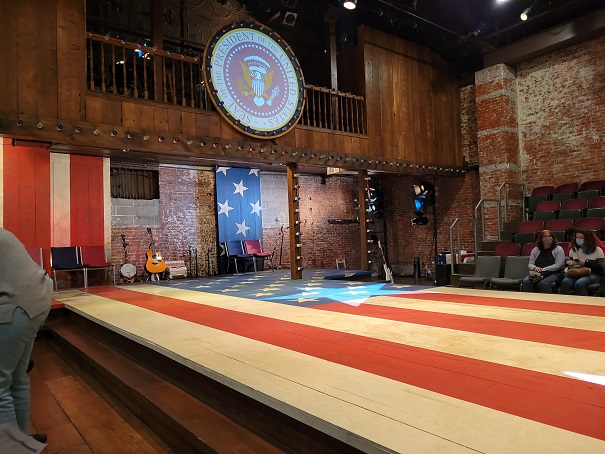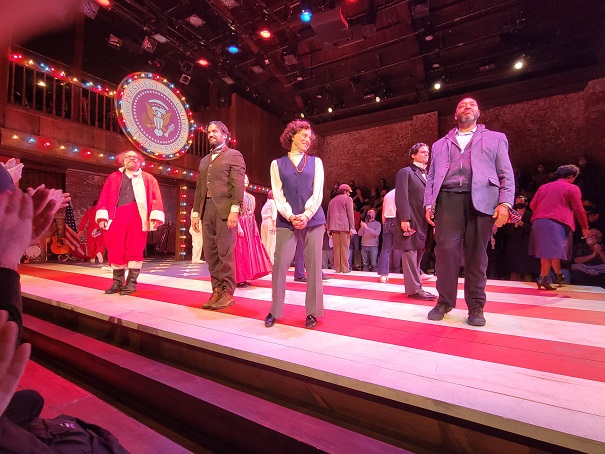Concert Diary: Stephen Sondheim’s “Assassins”
December 4, 2021
New York, N.Y.
In the world of Stephen Sondheim’s Assassins, Presidential assassins and wannabes form a club of sorts. They mingle, squabble, share experiences, and taunt and urge each other on to their historical destinies. And since this is a musical, they sing! They sing Sondheim songs! They sing Sondheim’s twisty melodies and unexpected rhymes, in the process giving them more prestige and dignity than they deserve, and contributing to the strangeness of this unnerving work.
That such a musical as Assassins should exist at all is highly unlikely. One can’t imagine a Hollywood studio greenlighting such a thing, or a newcomer to the stage getting away with it. But Stephen Sondheim had over a 30-year career behind him when he collaborated with John Weidman, who wrote the Assassins book. The show opened off-Broadway in 1990 to unflattering reviews, and limped for several years in various productions, until gradually accumulating more respect and interest with a successful Broadway run in 2004.
The Classic Stage Company in the East Village intended to stage Assassins in the spring of 2020. I had tickets for May 20, 2020, but the whole production was delayed by COVID for 18 months, and I didn’t get a chance to see it until Thursday evening. Stephen Sondheim apparently attended the opening night on November 14 before his sudden and unexpected death twelve days later.
This is the third Sondheim musical that CSC has staged, after Passion in 2013 and a shortened all-Asian-cast Pacific Overtures in 2017. These are not the easiest of Sondheim’s musicals, and they demonstrate a penchant for the CSC for taking risks. All three Sondheim productions were directed by John Doyle, who is a master of stripped-down minimalist musicals to fit the CSC space.
For Assassins, the stage was raised slightly off the floor and painted with an American flag:
The Presidential Seal above the stage was often used to project images of various Presidents during assassinations or attempted assassinations. A few musicians (keyboard, drums, and bass) were hidden away in the loft behind that seal. Other musicians — accordian, guitar, flute, clarinet, banjo, violin — were clothed in jumpsuits and wandered around the stage with the actors. Very few props were present: folding chairs, American flags folded into triangles, COVID facemasks with American flag patterns, an electric chair, Sara Jane Moore’s handbag, and guns.
Guns. Lots of guns. A nervewracking number of guns. So many guns that the CSC felt it necessary to provide some comforting information in the program:
All guns used during this performance are replicas that were provided, checked, and rendered inoperable by a weapon’s specialist for the safety of our artists and audiences. All gunshot sound effects are pre-recorded.
The closeness of the audience to the actors, singers, and musicians is one of the enjoyable characteristics of a CSC production. They’re literally just feet away. It’s this intimacy that lets John Boyle strip down the production to its essentials. But that also meant that we saw a lot of handguns being waved around in uncomfortable proximity, sometimes pointed straight at us.
Yet handguns are these assassins’ weapons of choice, and in the opening song “Everybody’s Got the Right,” the assassins learn that whatever personal problems they may be experiencing, they can solve them with the simple advice “C’mon and shoot a president” because “Everybody’s got the right to their dreams.”
What follows is only roughly chronological (with many exceptions) and of course nothing fits at all in a conventional dramatic or comedic narrative. Assassins is more properly described as a revue, which one online dictionary defines as “a light theatrical entertainment consisting of a series of short sketches, songs, and dances, typically dealing satirically with topical issues.” Exactly! But only if by “topical” is meant 150 years of American history and “light” describes political murder.
The head of this select gang of misfits and wackadoodles is, of course, John Wilkes Booth, who has achieved a legendary status as the first and historically most significant of Presidential assassins. “The Ballad of John Wilkes Booth” that follows is a duet with a guitar-wielding master of ceremonies called The Balladeer (Ethan Slater in this production), who mocks Booth for shooting Lincoln because his acting career was tanking, and Booth himself (Steven Pasquale), who claims to have acted to save the nation.
Every assassination in this revue is handled a little differently. For the attempted assassination of Franklin Roosevelt by Guiseppe Zangara, we hear from the bystanders who witnessed it, and in the song “How I Saved Roosevelt,” each of them explains how he or she prevented the assassination. With an agility only possible on the stage, we go back in time to hear a fiery political speech by Emma Goldman (Bianca Horn) that inspires Leon Czolgosz, who later killed McKinley, and a funny conversation between Sara Jane Moore (Judy Kuhn) and Squeaky Fromme (the scary Tavi Gevinson), a mismatched pair who both tried to kill Gerald Ford.
“The Gun Song” is one of the creepiest moments of Assassins, a barbershop quartet of sorts with Leon Czolgosz, Booth, Charles Guiteau (who assasinated Garfield), and Sara Jane Moore for comic relief. It begins with a rather Marxist (or perhaps Adam Smithian) view of guns:
It takes a lot of men to make a gun
Hundreds
Many men to make a gun
Men in the mines to dig the iron
Men in the mills to forge the steel
Men at machines to turn the barrel
Mold the trigger, shape the wheel
It takes a lot of men to make a gun
But as Booth adds:
And all you have to do is
Move your little finger
Move your little finger and
You can change the world
Why should you be blue when
You’ve your little finger
Prove how just a little finger can
Change the world
And Guiteau tells of all that a gun can do:
When you’ve a gun
Everybody pays attention
When you think what must be done
Think of all that it can do
Remove a scoundrel
Unite a party
Preserve the Union
Promote the sales of my book!
Ensure my future
My niche in history
And then the world will see
That I am not a man to overlook
One of the characters in Assassins who I had completely forgotten about is Samuel Byck, who had intended to hijack a plane and crash it into the White House to kill Richard Nixon. He’s dressed in a Santa Claus outfit throughout the musical (a costume that is apparently historically justified), and is first heard recording a message to Leonard Bernstein (which also happened). I’m not sure if that historical recording also including Dyck singing a few lines of the song “America” from West Side Story, the lyrics of which are, of course, one of Sondheim’s earliest successes. Very strange!
The songs that Sondheim has written for Assassins are often in the style of the period. Thus, the “Ballad of John Wilkes Booth” has a kind of old country feel to it, and a wonderful love song “Unworthy of Your Love” sung by John Hinckley and Squeaky Fromme is like a 70s pop ballad. Hinckley declares his love for Jodie Foster:
I am nothing
You are wind and water and sky
Jodie
Tell me, Jodie
How I can earn your love
I would swim oceans
I would move mountains
I would do anything for you
What do you want me to do?
Squeaky Fromme’s devotion to Charlie Manson is just a little different:
I am nothing
You are wind and devil and God
Charlie
Take my blood and my body
For your love
Let me feel fire
Let me drink poison
Tell me to tear my heart in two
If that’s what you want me to do
The comedic monologues and failed assassination attempts of Sam Byck, Sara Jane Moore, and Squeaky Fromme leave us unprepared for what’s coming. One assassin has not even been mentioned yet, and particularly for older members of the audience — including me, who turned 10 in 1963 — this one is traumatic. This one still touches a raw nerve, and this seemingly carefree mix of music, drama, comedy, and history lessons, suddenly gets very real.
In the song “Something Just Broke” people tell where they were when they heard the news.
I remember where I was
Just exactly where I was...
I’ll rememer it forever
And I thought
Where I was, what I was doing
Something just broke.
Of course, a proper revue wraps everything up by reprising the opening song, “Everybody’s Got the Right,” but now it’s quite different, coming nowhere close to dispelling our persistent shuddering grief, even with the joyous curtain calls.

